
"We Are Not the Other"
On a recent sunny afternoon, about 200 men and 20 women entered the Islamic Society of Sarasota and Bradenton’s large mosque on Sarasota’s Lockwood Ridge Road for Friday prayers, the main service for Muslims worldwide. The men, most dressed in clothes they wore to work—a repair service uniform, a few suits, casual pants and button-down shirts—headed into the large room downstairs. The women wore headscarves and salwar kamez—loose pajama pants, tight at the ankle, worn with a long tunic—long skirts or dark maxi dresses called jilbabs. They filed upstairs, a few with children in tow, to the prayer loft that overlooked the men below. When the imam started the service in Arabic, two women’s cell phones rang, and they scrabbled in their purses to turn them off.
Ruta Jouniari, a former Catholic from Boston, pointed down to the men. “He’s from Jordan. That one’s from Trinidad. He’s from Palestine.” She looked around again. “We have people here today from Morocco, Pakistan, Egypt, Nigeria, Zaire, South Africa, Senegal and Russia.”
Such international salmagundi is rare in most American churches, where people tend to look alike and speak the same language. But the region’s Muslim community is a microcosm of the national picture. In a January poll, the Institute for Social Policy and Understanding, a Washington, D.C.-based organization created to educate Americans about the American Muslim community, found that American Muslims are the most ethnically diverse of all faith communities surveyed. And they’re the only faith community surveyed with no dominant racial majority. About 25 percent of American Muslims are black, 24 percent are white, 18 percent Asian, 18 percent Arab, 7 percent mixed and 5 percent Hispanic. Half are native born and half are foreign born; 86 percent are citizens.
While mosques in large American cities may self-segregate according to nationality—African-American, Syrian and Sudani congregations, for example—mosques in smaller communities such as Sarasota attract Muslims from many cultures. “It is the ethos of the melting pot,” says Meira Neggaz, executive director of the institute. “In smaller cities and towns, people are brought together by the fact that there are limited worshipping opportunities.”
The Sarasota mosque is home base for worshippers from about 25 nations. Urdu, Arabic, Russian, Telugu, Farsi, Indonesian and English are among the languages spoken there. Members can struggle to understand one another during Friday prayers. On festival days, food ranges from Middle Eastern hummus and baba ganoush to South Asia’s chapatis and curries to North Africa’s kefta and chicken tagine.
But like the diverse collection of Muslims around the country, ISSB members are unified by their faith. And lately, they also share a sense of foreboding. News reports following Islamic State terrorist attacks along with the divisive presidential election have sparked fear and hostility, they say.
Tires have been punctured in the parking lot across from the mosque during Friday prayers. Anti-Muslim flyers have appeared on windshields. Some members say they’ve heard hostile comments from strangers, co-workers and customers. Some fear a registry.
“I grew up in New York,” says Nazeela Rahman-Shaw, an elegant and immaculately dressed woman from Guyana, who moved here almost three decades ago with her husband Peter. “I’d never experienced bigotry or racism. This is the first time I’ve felt unwelcome.”
Since President Trump’s proposed travel ban on six predominantly Muslim countries, she’s afraid to visit her husband’s relatives in London or her sister-in-law in Switzerland. What if she couldn’t come back into the country? And if Muslims were required to register, she wonders whether she and her husband would stay or move to another country.
Fear of Muslims has been rising in America, but in this country, crimes are more often committed against Muslims than by them. Hate crimes against Muslims in the United States rose 67 percent last year alone. The Southern Poverty Law Center reported that last year the number of Muslim hate groups in America tripled. Even Americans who would never join a hate group may be uneasy about Muslims.
According to a CNN report, in 2014, Muslims leapt ahead of atheists as the country’s “least accepted” religious group. Such fears often vanish when people get to know each other; witness the growing acceptance of gay rights and gay marriage during the past few decades as LGBT coworkers and acquaintances became more open about their sexuality. But most Americans don’t have Muslim friends or even acquaintances. According to a study by the Public Religious Research Institute, six of 10 Americans say they have seldom or never had a conversation with a Muslim.
Visible signs of Muslim culture can seem unfamiliar or even threatening to many Americans. Wearing a hijab, for example, may look like a sign of female oppression. But in Its Virtue is Modesty, a short film about local women who wear and do not wear a hijab, produced by Sarasota’s Alex Coe, some women embrace the hijab, saying it frees them from being perceived as sexual objects. “I chose it,” declared one Pine View high schooler.
Officials at the mosque say they decry terrorism and would oppose it among their members. “If we find anybody who’s radicalized and is a threat to our society, to the community, the country, we are going to let law enforcement know,” says Shiraz Hassan, the South African-born president of the mosque.
A spokesperson for the Sarasota County Sheriff’s Office says it has a “very positive and professional working relationship” with ISSB, which has reported threatening letters and calls to the office. The ISSB has always been responsive to any requests for information, the spokesperson adds.
And Muslims here are quick to say that despite some threatening letters and vandalism, many Sarasotans have embraced them. A group of white men and women stand outside the mosque every Friday during prayers with signs that say “Love Your Neighbor” and “Love Trumps Hate.”
Muslims are the fastest-growing religious group worldwide with 1.6 billion adherents, according to a 2015 Pew Research report. Christianity is still the world’s largest religious group, but by the end of the century, if trends remain the same, believers of Islam will outnumber Christians. While no official count exists of American Muslims, since the Census Bureau doesn’t ask about religious beliefs, the Pew study estimates that 0.9 percent (3.3 million) of the world’s Muslims live in the United States, a percentage that is projected to increase to 2.1 percent (8.1 million people) by 2050.
Hassan says that 20 years ago only a few Muslims lived in the region. Some of them worshipped in a small home on the Lockwood Ridge property where the mosque now sits. He estimates that between 300 to 400 families now attend services at the mosque—the only one within a 50-mile radius—at some time during the year.
Local Muslims raised $2.6 million to build the 11,350-square-foot mosque in place of the home where they used to gather and finished construction in 2012. The building is impressive, with a huge courtyard, men and women’s prayer places, a big kitchen and small rooms for meetings and education.
“The mosque is the center for everything,” says Hassan.
Last year, ISSB received approval from the Sarasota County Commission to start a private K-8 school that would follow the Florida State Standards and teach Arabic and the Quran. About 30 children are enrolled for the fall 2017 semester, and the mosque eventually will have space to accommodate up to 135 students.
ISSB is also open to visitors, hosts food and cultural festivals, and at Ramadan sends members to speak at schools and churches. It’s a center for the All Faiths Food Bank and supports a free health care clinic started by one of its members, Pakistani-born internist Dr. Shahnaz Ahmed.
The first small wave of Muslim immigrants arriving in Sarasota was made up of Moroccans, who were acrobats with the circus. The congregation grew slowly, but in the last two decades more newcomers have arrived. Members say they came for the same reasons most people end up here—warm weather, beautiful beaches, culture, and a feeling that this would be a good place to raise a family or retire. And like members of other Sarasota places of worship, they range from retirees to young people and have a wide range of occupations.
We asked six members of the mosque about their lives, what brought them here, and what it’s like to be Muslim in Sarasota today.
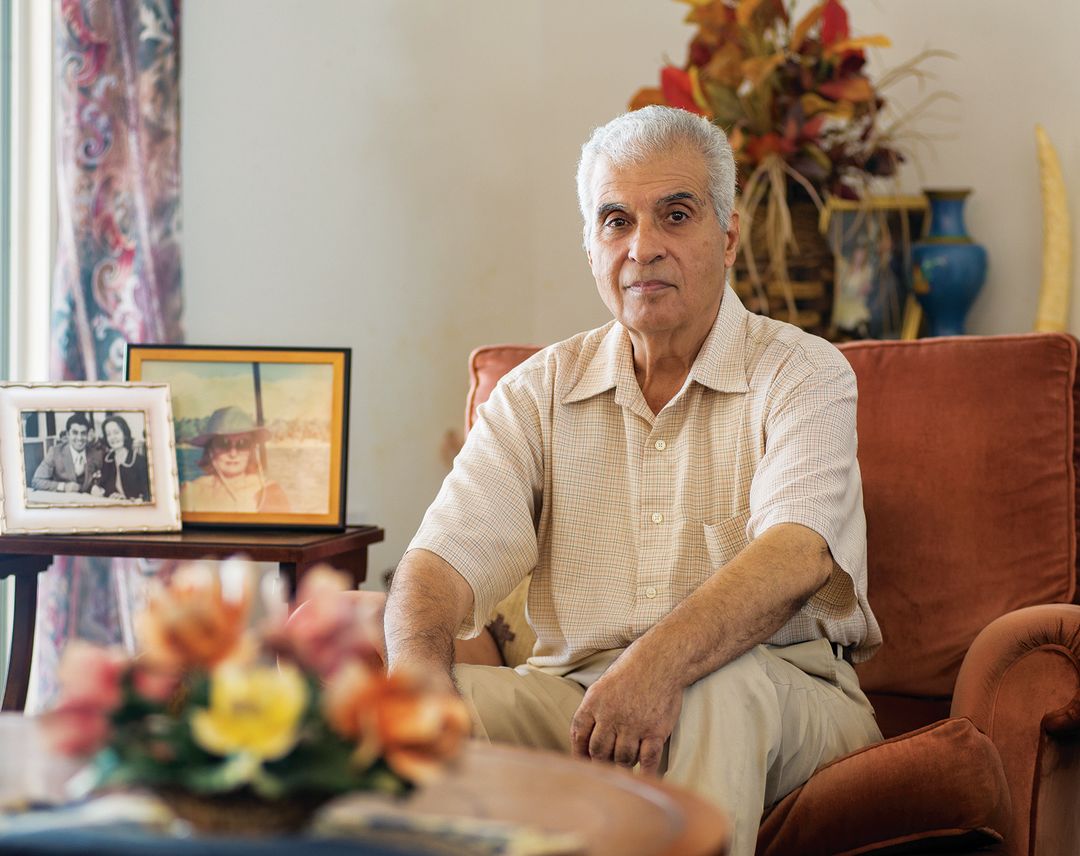
Samir Khatib
Image: Barbara Banks
Samir Khatib
“We had only the clothes on our backs.”
In 1948, during the Arab-Israeli war, his mother grabbed 3-year-old Samir Khatib and his younger sister and fled Jaffa, now part of Israel. They were some of the hundreds of thousands of Palestinians uprooted in the war.
“You remember the horrors,” he says. “We had only the clothes on our backs. Afraid of hunger, afraid of where you’re going to be. No one knows unless they are a refugee.”
The family wound up in Jordan, where they struggled. Desperate, Khatib’s father told him that he could no longer afford to feed him. As the oldest son, Khatib had to work. He left school at 13 and began digging ditches for a British company installing telephone lines.
After 18 months, his prowess with English landed him a job as a translator for the company. Eventually, he finished high school and found himself in college in Holland. A five-day vacation in England ended up being a permanent move. Only 19, he met his future British wife, Ann, the day he arrived and enrolled in school in London to study international finance and marketing.
Khatib became the chief currency trader of an international bank in London and later opened his own brokerage firm, becoming a consultant to big banks. He worked long days in a high-pressure environment. “I’m fast with numbers and calculations,” he says. “In this business, it’s about the speed of seeing a good deal.” He also has the temperament to roll with the market’s ups and downs. “My attitude was ‘Make it fresh tomorrow,’” he says.
In 1980, Khatib discovered Sarasota and the family started coming for vacations. In 1992, he moved to Venice, where he and his wife built a spacious house on a canal.
Family is paramount in his life and culture. He cared around the clock for his wife until she died this spring. Their two sons, one in Tampa, and another in Nigeria, visit when they can. Like many immigrants, he keenly feels the distance between him and his family back home. The eldest of all his siblings, he put them through school and paid for their weddings.
At 72, Khatib says his faith and the Islamic Society have become a bigger part of his life. He joined the society’s board and has lectured about Islam to local churches. The great religions are all similar, he says.
“God wants us to be brothers and help one another,” he says. “It’s the essential element of being human.”
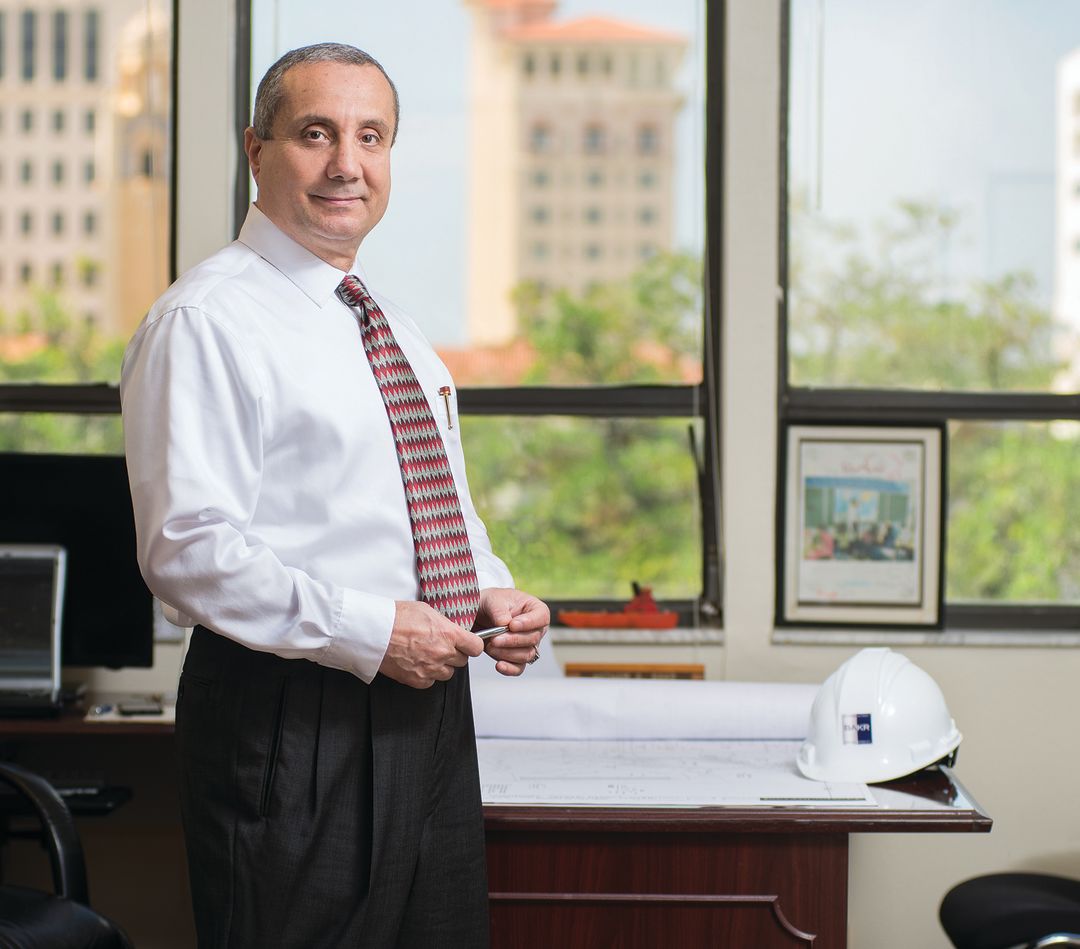
Hytham Bakr
Image: Barbara Banks
Hytham Bakr
“I look at what good Trump will be able to do.”
As a college student, Egyptian-born Hytham Bakr came to the United States in 1979 to visit family in New York and New Jersey. “I liked what I saw,” he says. “The mass. The high-rise buildings. The wide streets. ‘This is where I want to be,’ I thought.”
He transferred to the New York Institute of Technology, earning an architecture degree and then a master’s in civil engineering from the New Jersey Institute of Technology. Along the way, he married Diane, an accountant, an “American girl,” he says, who converted to Islam. They had two children and a home in New Jersey.
Bakr, 61, doesn’t remember encountering hostility about his religion. “My accent was an issue, but not because I was Egyptian or Muslim,” he says. “I never had a problem.”
A friend told the Bakrs about Lido Beach, so they headed there for a vacation in 1988.
“I’m from Alexandria, where the water is turquoise-blue,” he says. “Once I crossed the bridge to St. Armands Circle and saw the water, I said, ‘This is it.’ I ended up buying a condo that day.”
Eventually, Bakr moved to Sarasota where he opened his own firm, the Bakr Group, in 1999. With five employees and an office in Washington, D.C., the company does engineering and project management, both for local clients and the government. They worked with downtown’s Hollywood 20 and on the renovation of Dolphin Tower.
A funder and the project manager for the design and permitting of the Islamic Society of Sarasota and Bradenton, Bakr is a board trustee and the mosque’s spokesperson.
He says he still hasn’t encountered animosity from Americans, and he hopes that President Trump carries out his promise to make America great again.
“Some people think Trump is going to mess up the world. I look at what good he’ll be able to do,” he says. He mentions the administration’s plans to spend on infrastructure and reform the tax code. “You’ll see that America is bigger than Donald Trump,” he predicts.
And he believes people’s similarities outweigh their differences. “People are all the same,” he says. “We go to school, soccer practice, have dinner, go to sleep and go to work the next day. Let people live and they’ll work it out together.”
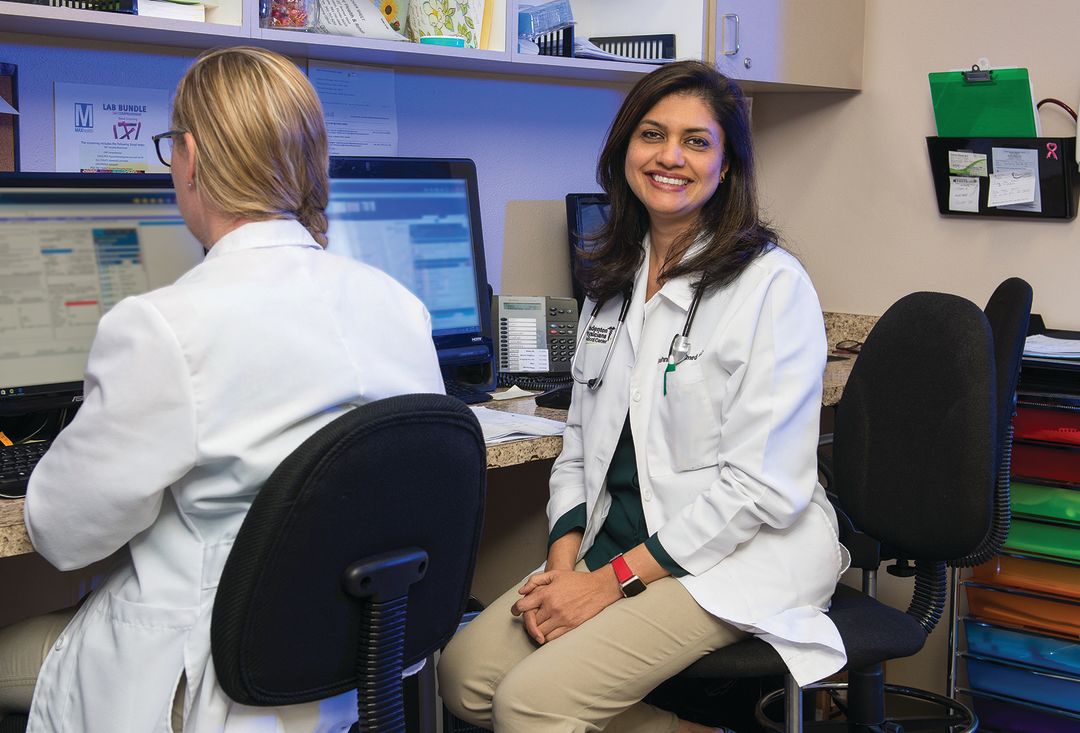
Shahnaz Ahmed
Image: Barbara Banks
Shahnaz Ahmed
“It’s for a better life.”
Fresh from medical school in 1988, Dr. Shahnaz Ahmed, a lively Bradenton internist, left Lahore, Pakistan, to follow her husband to Pennsylvania’s Lehigh University. She took a job with nearby St. Luke’s Hospital. When her husband finished his master’s in computer science, the couple and their two young children returned to Pakistan.
Bur career opportunities for her were limited, and one night, four men burst into their home and held guns to their children’s heads, demanding money and jewels.
At that moment, the Ahmeds decided to come back to America.
Her former partner at St. Luke’s convinced her to come to Bradenton to start a practice, and once the Ahmeds arrived in 1998, they looked for a mosque, hoping to meet other Indians and Pakistanis.
A few Muslims from a variety of countries were meeting at a Lockwood Ridge home, and Dr. Ahmed began to attend. She has stayed with the group as it’s grown, but she admits cultural differences can be a problem.
For example, she says, “In Pakistan, women’s dress is like pants. In Middle Eastern countries, they wear long skirts. There were comments that I couldn’t go to the mosque because I’m wearing pants.”
Dr. Ahmed continued to wear pants. “You can’t go to work in the morning and then say, ‘Now put up the curtain between [men and women].’ The problem is the rigidity of people, not the religion.” She says younger Muslims are more flexible and don’t have “the hang-ups of their parents.”
A passionate advocate for her patients, Dr. Ahmed, 53, worries that not all Americans get the health care they need. That led her to start The Universal Crescent Clinic, a nonprofit clinic, supported in part by the mosque, where she treats uninsured patients of every background for free on Saturdays. She says she’s always enjoyed her patients’ trust and support. After 9/11, some patients who were veterans told her, “We’ll bring our guns and stand outside your office if you feel any threat at all.”
But this year, one patient told her she was “Osama bin Laden’s sister” and an ISIS sympathizer.
American Muslims bear some responsibility for the mistrust, she says. Until recently, they were slow to reach out. She says statements against Muslims have inspired many Americans and Muslims to speak out and “stand together.”
She says Americans may not realize how much immigrants love this country. “It brought them freedom,” she says. “It brought them financial and emotional well-being and security for their children. We left our parents, our homes, our schools. It’s for a better life.”
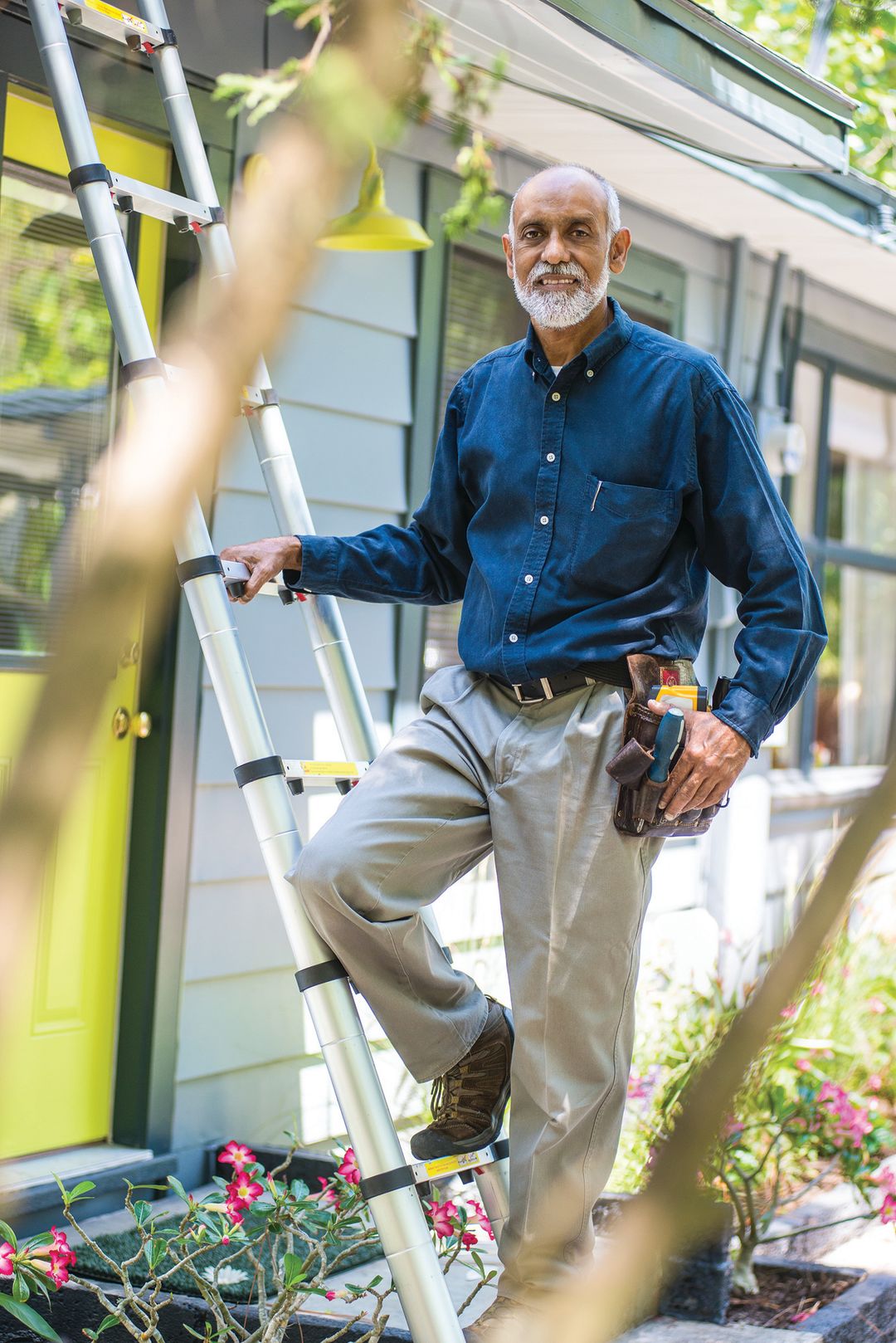
Shiraz Hassan
Image: Barbara Banks
Shiraz Hassan
“Terrorists don’t and have never represented us.”
Born in South Africa, Shiraz Hassan, now 54, came to America in 1993 when his wife, Nazira, got a permit to work here as an occupational therapist at skilled nursing facilities. Her first assignment was in Alabama, but every three to six months she was transferred to a different city or state, and they packed up their two preschool-age children and traveled around the country.
Hassan, who had a degree in construction management, raised the children full-time. By the time the kids needed to attend school, they were in Bradenton, and Hassan became a home inspector.
He began to pray with other local Muslims before the Islamic Center of Sarasota and Bradenton was built and today he is president of the ISSB board. After one recent Friday prayer service, Hassan urged members to volunteer to cook food for the homeless at the Salvation Army and to march across the Ringling Bridge in support of refugees.
“We do a lot [of outreach],” he says. “It started several years ago. We all live here. Whatever you get, you need to give back. It does more good for you than the other person.”
Like many Muslims interviewed for this story, Hassan has had minor encounters with hostile people. He ignores them, but he adds that American Muslims are feeling apprehensive since President Trump’s election. “It’s become open season,” he says.
But the local community, he stresses, has been supportive—“beyond our expectations.”
Hassan says he’s often asked, “Why don’t you denounce terrorists?”
“We do—all the time,” he replies. But he adds that all Muslims are not responsible for the actions of individual criminals who may be Muslim. “Some terrorists do things in the name of Islam. They don’t and have never represented us,” he says. “The major thing is that every [Muslim] person living in Sarasota is American,” he emphasizes. “Everything else is secondary. We are not the other.”
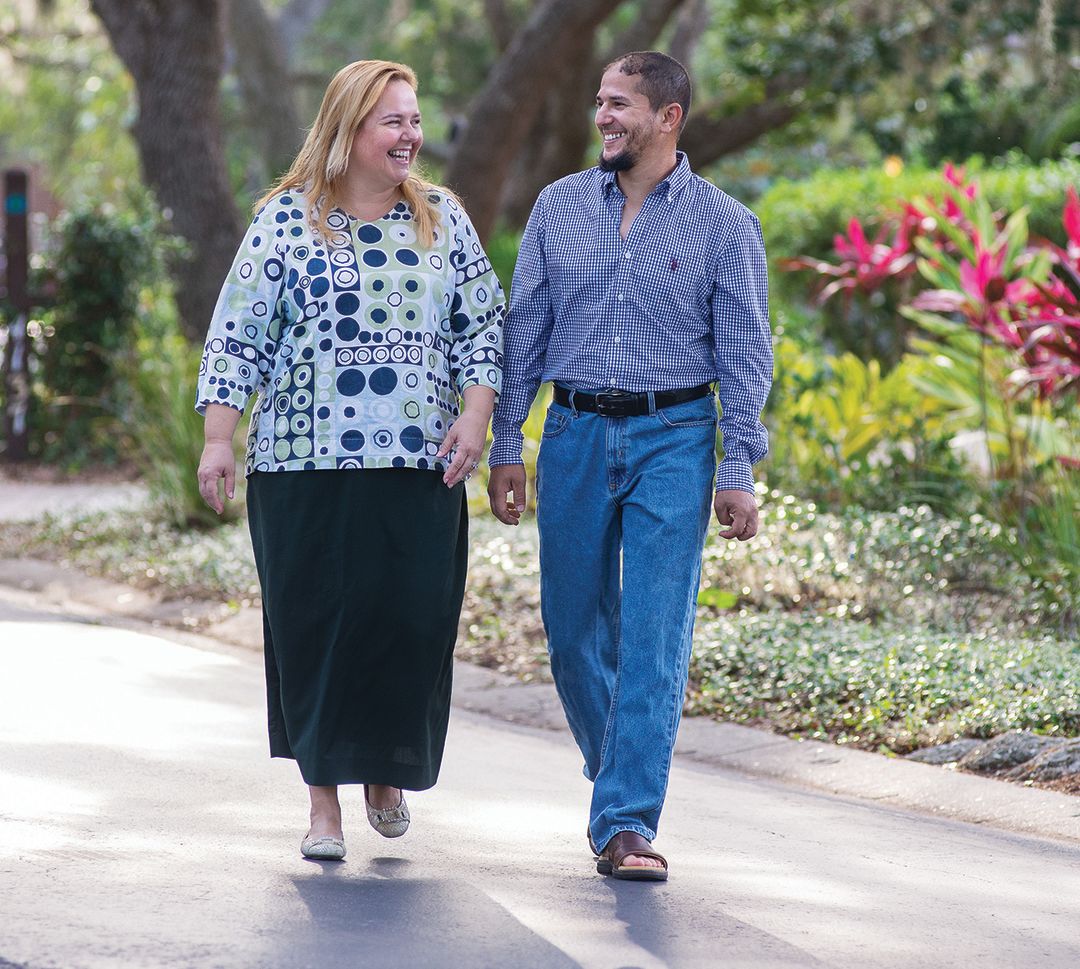
Ruta and Noureddine Jouniari
Image: Barbara Banks
Ruta and Noureddine Jouniari
“Fear works here and everywhere.”
Ruta and Noureddine Jouniari met on Siesta Beach in 1996. Noureddine, a 22-year-old acrobat with a Sarasota-based circus, was practicing tumbling. Ruta, a 27-year-old health care consultant, was living in Boston, vacationing with girlfriends. Raised worlds apart, they didn’t imagine a future.
Ruta, blonde and outgoing, is one of five children of Lithuanian immigrants. Noureddine, dark, handsome and a little shy, was born in Morocco and in 1995 moved to Gibsonton, Florida, and began performing with the Bentley Circus. “My main concern was, ‘Can I find a mosque in the United States?’” he remembers.
After Ruta’s Siesta Key vacation, she and Noureddine wrote and spoke on the phone. Eventually he came to Boston to meet her family. “We were in love, but culturally we were so different,” she says.
Ruta converted to Islam and the couple married in 1999. Today Nourredine works as a plumber. Ruta founded ISG Inc. and is a U.S. contractor for hiring ex-U.S. military personnel to teach Saudi Arabians how to use U.S. weaponry.
Converting to Islam wasn’t easy, she says. She studied the Bible, the Torah and the Quran for two years before making her decision. She was drawn to Islam’s emphasis on humility and treating all people with kindness. And she says she gained a community: “I’ve traveled around the world and you can walk into any mosque and say, as-salamu ‘alaykum, peace be upon you, and you are greeted with a smile and a kiss. It opens a brotherhood and sisterhood.”
It took time for her parents and siblings to accept her conversion. For some converts, the family never heals, she says.And the divorce rate for converts is high. She continues to celebrate Christmas and Easter secular traditions with her family, and “they know I married a good person,” she says.
More challenging for her is the Islamic separation of men and women. “I am still adjusting even 20 years later,” she says. After all, she points out, “I work 100 percent with men in my company every single day.”
Noureddine has asked her if she has to keep working. “I do,” she told him. “He doesn’t feel 100 percent happy with it. It’s not his culture. But in Islam, a woman has a right to work, earn her own money and have her own business.”
Both she and Noureddine say negative perceptions of Muslims are taking their toll. Noureddine has heard some customers advocate deporting all Muslims. But his employers have been understanding of his need to pray throughout the day, and he takes Friday afternoons off for the main prayer service.
“Propaganda and fear work here and everywhere,” says Ruta. “The only way to combat misperceptions is for people to meet Muslims, and see that they want the same as everyone else—safety for their kids, a good home and a nice way of life with peace.”